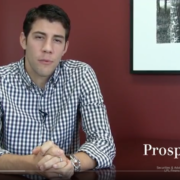4 Financial Tips to Teach Your Kids
When I meet someone with good money habits it’s usually because they have someone important in their life, a family member or friend, who took the time to share their financial values and experience. For those fortunate people, money management skills come easy. These skills were ingrained as a child and will serve them well into adulthood.
But some of us haven’t had a mentor. So if you’re a young person just starting out or you’re older and looking to develop better financial habits I hope this article helps you get started down the right path.
It’s important to recognize where your money beliefs come from. We all know most habits start at a young age. Finance is no different. As with all habits, these are so ingrained in your core beliefs by adulthood changing them can be very difficult. As with investing, it’s important to understand your emotional response and keep a level head. If you experience any resistance to these ideas it’s likely coming from money messages learned early in life.
When it comes to finance there is a tendency to overcomplicate issues leading to apathy and denial. Here are some key principles for reference:
Daily Living
Living within your means and limiting debt go hand-in-hand. If you’re having trouble living within your means the answer is not additional debt. Either reduce your spending or increase your income through a second job or by learning additional skills that increase your earning potential. Taking on more debt to support a luxury lifestyle is an unsustainable practice: one that can quickly derail your financial future.
Life is a balancing act. Being too frugal is just as bad as living a lifestyle your income cannot afford. A fulfilling life is not 30 years of hard work, no fun, and a million-dollar funeral. Life is about the journey: expanding your knowledge through education, new experiences, new challenges, and nurturing important relationships. Use your money to enhance the journey, not the destination.
Rainy Days
Life is full of setbacks. The true measure of a person is how quickly he/she bounces back. Having an emergency reserve smoothes out the occasional financial obstacle. Without an emergency fund you may be forced into borrowing money you don’t have alongside the emotional stress of dealing with a crisis. Being prepared for an emergency is the best way to ride life’s bumpy roads. I suggest having at least two months’ expenses in an easy-to-access location in case the need arises.
For bigger emergencies, insurance is a very effective tool. Long-term disability is important for a young adult, followed closely by life insurance. Long-term disability protects your most valuable asset: the ability to earn an income. If anyone is dependent on you to provide that income, life insurance is also appropriate. (I recommend term for young people.)
Owning a home and driving a car require their own forms of insurance. An umbrella policy provides coverage over-and-above what’s provided by home and auto insurance.
Lastly consider long-term care insurance. It may be appropriate for a young person who requires assistance performing activities of daily living as the result of an accident or illness.
The Future
Life is generally pretty predictable. There’s birth followed by 18 years in a family environment. Then comes college. After college, work starts. Somewhere along the way is marriage and another family. Sprinkle in a few rainy days and some gray hair. At about 65 you start thinking work is for the birds. You stop working and begin living off your savings, pensions, social security, etc. The next 15-20 years are spent having fun, followed by a period of time where health issues are a high priority.
The point is you’ll always need money but you won’t always want to work for it. The easiest, safest, and most strategic method for that success is to start saving today. Shoot for at least 10% of your income, more if possible, less if impossible. If you receive a raise or bonus set most of it aside. Take advantage of any employer matches in your company retirement plan. Make goals and track your progress along the way.
Setting aside enough money to live on is not an overnight task. It requires sacrifice, deferred gratification, and the intangible aspect of addressing a future event in the present. The only way to achieve this challenging goal is by paying yourself first. Automatically have money taken from your paycheck or checking account and deposited into a saving account.
When you’re young, invest for growth. Time is on your side when it comes to volatile investments. If they don’t work out, there’s plenty of time to recuperate. Save the boring investments for later in life when volatility (and a flimsy income) is not an option.
Traps
Human nature is a powerful force. The challenge is to avoid being your own worst enemy. There is a tendency to want something for nothing; to believe everyone else is right; to not be left behind; to abandon common sense. If someone tells you they can double your money in one year it’s probably too good to be true. The world (and especially the internet) is filled with the “get rich quick” crowds hoping to use your ignorance to their advantage. Remember, getting rich doesn’t happen overnight.
Just because someone else jumps off the bridge does not mean you have to. Your neighbor buys a BMW, so now the only acceptable car to have is a BMW. Your neighbor is in debt up to his eyeballs, do you want to be as well?
If you can avoid financial traps you have a greater chance of being happier and more fulfilled than someone who is constantly trying to game the system or spend beyond their means.
Conclusion
Not all advice is wasted on the young. If you know these skills and have these habits, take the time to share them with your kids. Encourage them to save and spend wisely. If you become overwhelmed with financial noise, fall back on the simple principles of daily spending, saving for rainy days and the future, and avoiding traps along the way. Ingrain these habits into your kids when they’re young and watch them grow into happy and financially healthy adults.
As a Prosperion Advisor, Craig has the independence, support and resources to help clients with what he does best – listening to their stories, discovering their desires, and identifying their greatest financial risks, before developing a comprehensive approach to meeting those needs. Learn more about Craig here.
Securities offered through LPL Financial. Member FINRA/SIPC







